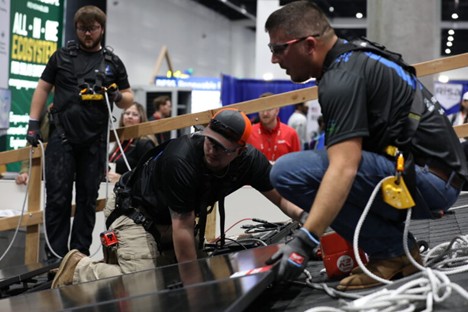U.S. House passes bill that will gut solar industry tax credits

The solar industry keeps warning Congress that the reconciliation budget bill being drafted by the U.S. House of Representatives will be harmful to the industry, to U.S. manufacturing, energy resiliency, and the economy. And the House keeps responding by making the language even more harmful.
Hm. Are they trying to tell us something?
The House reconciliation legislation passed last night, and a “manager’s amendment” issued at the end of the process cut even more from the Inflation Reduction Act tax credit incentives for all sectors. Here’s a brief rundown:
- End the residential solar investment tax credit (25D)
- End the applicability of residential solar leases for 48E tax credits.
- The 48E (ITC) and 45Y (PTC) phaseouts would be removed, and the credits would go away completely for any project not placed in service (PIS) by year end 2028.
- There is now a construction start requirement within 60 days of the bill enactment.
- Transferability would be eliminated for 45X tax credits for manufacturing upon enactment of the legislation.
- Transferability of 48E/45Y would be eliminated two years after enactment.
Solar industry and U.S. impact
New analysis released by the SEIA warns that the budget bill, if enacted, could trigger an immediate decline in solar and storage investments. By 2030, up to $220 billion in investment could be lost. Roughly 80% of all at-risk factories, jobs, and investments in the solar manufacturing sector are in states that voted for Trump. That was before several of the last second changes prior to passage.
According to the ACP’s newly released State of Clean Energy Manufacturing in America report, more than 800 manufacturing plants are currently contributing to the U.S. renewable energy supply chain, with at least one in every state. Meanwhile, 200 existing manufacturing facilities are actively building primary renewable power components across 38 states to supply the booming demand for new energy in the United States.
With 200 renewable power manufacturing facilities in the pipeline, representing more than $150 billion in investment, the ACP report shows that if all announced facilities become operational by 2030, renewable power manufacturing could support more than 575,000 jobs, generate more than $40 billion in earnings, contribute $86 billion to the GDP, and add $164 billion in output to the economy annually.
SEIA commentary
Abigail Ross Hopper, president and CEO of the Solar Energy Industries Association (SEIA): “If Congress does not change course, this legislation will upend an economic boom in this country that has delivered an historic American manufacturing renaissance, lower electric bills, hundreds of thousands of good-paying jobs, and tens of billions of dollars of investments primarily to states that voted for President Trump.
“This unworkable legislation is willfully ignorant of the fact that deploying solar and storage is the only way the U.S. power grid can meet the demand of American consumers, businesses, and innovation. If this bill becomes law, America will effectively surrender the AI race to China and communities nationwide will face blackouts.
“But that’s not all: Americans’ electric bills will soar. Hundreds of factories will close. Hundreds of billions of dollars in local investments will vanish. Hundreds of thousands of people will lose their jobs. Families will lose the freedom to control their energy costs. And our electric grid will be destabilized.
“It’s not too late for Congress to get this right. The solar and storage industry is ready to get to work with the U.S. Senate on a more thoughtful and measured approach to unleashing true American energy dominance to create a brighter future for all Americans.”
SEMA commentary
Mike Carr, Executive Director of the Solar Energy Manufacturers for America (SEMA) Coalition, released this statement:
“Despite many reassurances that Members support domestic manufacturing, a vote for this bill was a vote to close U.S. factories and concede manufacturing jobs of the most important energy resource of the 21st century to China. While we appreciate the endorsement of the Advanced Manufacturing Production Tax Credit by the House, this retroactive repeal–with many contracts in place for U.S.-made products through 2030–of the incentives to purchase American-made solar components undermines existing commercial agreements.”





Comments are closed here.